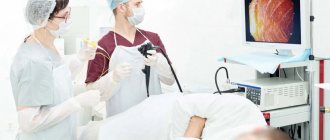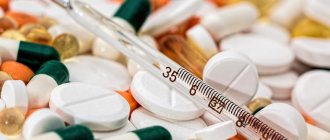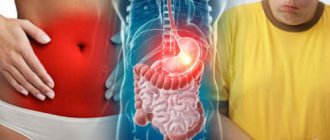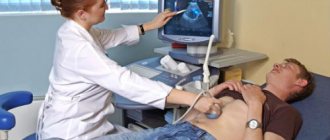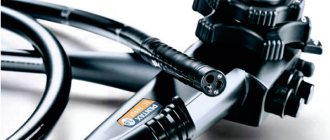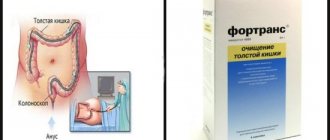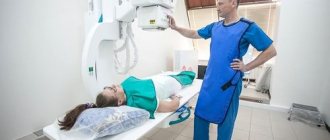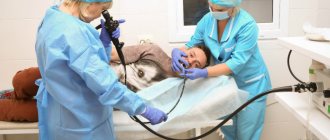Colonoscopy
– an endoscopic method for examining the inner surface of the intestine using a special device – a colonoscope. The flexibility and softness of the thin probe allows it to painlessly pass through all anatomical curves of organs, identifying various pathologies with high accuracy. The length of the device, equipped with a miniature video camera and lighting, is approximately 160 cm. The image is instantly transmitted to the monitor screen in multiple magnification. Thanks to this, the specialist can examine in detail the inner surface of the area under study, identify foci of inflammation and the nature of changes in the mucous membranes.
Indications for colonoscopy
Colonoscopy is prescribed in the following cases:
- frequent pain in the intestinal area
- bleeding
- purulent or mucous discharge from the rectal canal
- suspicion of inflammatory processes
- sudden, causeless weight loss
- the presence of cancer in the gastrointestinal tract in close relatives
- remove tumor or polyp
- remove foreign body
- stop the bleeding
- do a biopsy
- restore intestinal patency during narrowing (stenosis)
- eliminate adhesions
- identify the nature of hemorrhoids
Colonoscopy can be used to perform a number of medical procedures:
A referral for a colonoscopy is issued by a proctologist, gastroenterologist, or surgeon. The procedure itself is performed by an endoscopist. During the manipulation, he is assisted by a nurse and an anesthesiologist (if there is a need for general anesthesia).
Contraindications
There are cases when a colonoscopy is postponed or not performed because the risk of harm outweighs the benefit. These situations include absolute contraindications:
- Intestinal perforation
- Cardiovascular failure
- Myocardial infarction in the acute stage
- Respiratory failure
- Stroke in the acute stage
- Shock
- Peritonitis and colitis
In case of relative contraindications, colonoscopy is temporarily not performed.
Relative contraindications:
- Arrhythmia
- Poor preparation
- Local inflammation in the anus
- No echocardiography (ECG)
- Open operations less than 14 days ago
- ARVI, fever
Preparing for a colonoscopy
An examination of the intestines requires careful preparation, so the decision on the need for it is made by the doctor based on a combination of clinical history and laboratory results, the current condition and age of the patient. If traditional colonoscopy is not possible, alternative methods are used.
The process of preparing for the procedure includes two stages - switching to a slag-free diet and cleansing the intestines. Three days before a colonoscopy, it is recommended to switch to a gentle diet, excluding fresh fruits and raw vegetables, cereals and pasta, brown bread, fried and smoked foods from the daily menu. It is advisable not to drink carbonated water, coffee and milk. They can cause severe fermentation in the intestines and bloating.
Allowed:
The next stage of preparation is intestinal cleansing.
For this purpose, special laxatives are used. The specialist prescribes a remedy suitable for each patient according to his individual indications.
Most used medications:
The mechanism of action of the drugs Fortrans and Endofalk is that they prevent the absorption of substances in the intestine. This leads to faster movement and evacuation of the contents (in the form of liquid stool) of the gastrointestinal tract. Due to the content of electrolyte salts in laxative preparations, disruption of the body's water-salt balance is prevented (dehydration does not occur, as with ordinary diarrhea).
The action of the drugs Fleet Phosphosoda and Lavacol is based on a delay in the excretion of water from the intestines, which causes an increase and softening of feces, increases peristalsis and leads to rapid emptying.
Another way to cleanse the body is a traditional enema. The procedure is carried out several times using 1.5 liters of clean water.
It is important to remember that on the eve of a colonoscopy, it is advisable to skip dinner, and on the morning of the procedure, you should not have breakfast.
Answers to frequently asked questions and useful information
How long does a colonoscopy take?
The total duration is 10-15 minutes if endoscopy is performed without biopsy and removal of polyps. When minor surgical intervention is needed, the time is increased by 5-10 minutes.
Features of performing colonoscopy under anesthesia
The difference between a sleep examination and a procedure without sedation is that pain, emotional distress and fear are excluded. At the WMT clinic, we offer colonoscopy under anesthesia, as safety increases (there is no fear of “piercing the intestine”), and the doctor conducts the examination without distractions or haste.
Is recovery required after a colonoscopy?
Waking up from drug-induced sleep, you may feel drowsy and disoriented in space, so for 4 days after FCS, you should not drive or play sports under anesthesia. Do not stop your diet suddenly after the procedure. Introduce foods gradually to allow the stomach to adapt.
What to do if a colonoscopy makes you afraid?
If a colonoscopy makes you afraid, look at the photos of how the examination is carried out in our clinic.
Visualization improves perception and reduces fear of the unknown. The second recommendation is to read reviews about the endoscopist you are going to see for an intestinal colonoscopy. Reviews share stories and encourage positivity for future patients.
The third recommendation is to undergo the FCS under anesthesia to get pain relief and emotionally calm down.
Colonoscopy for anal fissure
Anal fissure is a spontaneous rupture of the mucous membrane of the anal canal due to inflammation and constipation during defecation. If this defect is present, pain may occur during diagnosis. To make the examination painless, FCS is performed under anesthesia. The patient falls asleep for 15-30 minutes, and the doctor examines the intestines. During an examination under anesthesia, the condition of the subject is monitored by an anesthesiologist-resuscitator.
Colonoscopy of the intestine for hemorrhoids
Hemorrhoids are not a contraindication to FCS if there is no bleeding or pain. If the disease is in an acute stage, you must first contact a proctologist and then undergo an examination.
What parts of the intestines does the doctor check?
During endoscopy:
- Colon examination
- Colonoscopy of the rectum
- Examination of the cecum
- Partial colonoscopy of the small intestine (10-30 cm distal)
Is there a difference between colonoscopy and colposcopy?
Yes, sure. Colposcopy is performed on girls annually after the start of sexual activity. It is an examination of the vagina and cervix to detect pathologies, inflammation, and neoplasms. To put it simply, colonoscopy is gastroenterology and proctology, colposcopy is gynecology.
Performing a colonoscopy
Given the possible discomfort during manipulation, the procedure requires mandatory anesthesia. There are several options for pain relief during a colonoscopy. This is local anesthesia (treatment with ice-caine, luan gel, dicaine ointment, etc.), sedation (introduction to light medicated sleep) and general anesthesia. Local anesthesia is most often used. It allows you to communicate with the patient, thereby freely controlling the progress of the entire procedure.
A colonoscopy examination is carried out in a separate room at a medical institution. The patient changes into a special robe and lies on the couch on his side with his knees bent. After antiseptic treatment, the doctor carefully inserts a colonoscope into the anus, sequentially examining the intestinal walls. First, the area of the lower parts of the gastrointestinal tract is examined, then the condition of the sigmoid and cecum, as well as part of the small intestine, is assessed. A small amount of gas is injected to expand the lumen of the intestinal tube. In this case, the patient may be bothered by slight bloating. At the end of the examination, excess air is removed and the feeling of bloating disappears. A typical diagnostic procedure lasts approximately 15-20 minutes. If there is a need for urgent surgery, the time may be increased. After the colonoscopy is completed, the device is carefully removed from the intestine and sent for disinfection. The patient is advised to take a short rest and return home.
When can I get my colonoscopy results?
A description of the intestinal condition can be obtained a couple of days after the procedure. If a biopsy was performed during colonoscopy, the time period increases until the histological examination data is obtained. In the conclusion, the compliance of the patient’s intestinal tube with certain criteria is indicated, as well as additional manipulations performed (if any). In addition to documents, you will be given a disc with a photograph or a reproduction of the colonoscopy process. Patients pass on the information received to the attending physician to determine further tactics for patient management.
Stages of the procedure
A colonoscope is a flexible tube with an endoscope that is inserted through the mouth into the intestines. The gastroenterologist inserts various instruments through the tube. Using a small camera, images taken of the intestine can be seen on a computer screen.
Some patients find colonoscopy unpleasant and sometimes the procedure is painful. Throughout the examination, patients receive a venous cannula, through which the doctor can dose the concentration of tranquilizers and painkillers.
Colonoscopy procedure under anesthesia
During a colonoscopy, a gastroenterologist examines the inside of the colon. It cannot diagnose existing tumors, but it can remove adenomatous polyps. During a colonoscopy, the gastroenterologist removes either part of the tissue or the entire polyp.
Side effects of colonoscopy
Colonoscopy usually goes without consequences. Serious complications occur very rarely. Most often they are associated with the doctor’s lack of experience in performing such endoscopic manipulations. Possible risks include:
Reviews by patients
Victoria Kravchuk
Today I underwent gastroscopy and colonoscopy in my sleep at the WMT clinic with Viktor Viktorovich Golfand. A wonderful specialist, he explained everything, put me at ease, the nurses are wonderful, they do everything for comfort, the hospital is beautiful! As soon as I came to my senses, they helped me and said: “Everything is fine with you, let’s wake up!” I recommend this wonderful clinic and doctor to everyone!
Dmitry Lobchuk
I had a colonoscopy done in a dream with Alexander Yakubovich. Only positive emotions! The doctor is incomparable and a specialist - nothing hurt after the procedure from the word “at all” (even in the presence of aggravating circumstances in the form of hemorrhoids and fissures), the pain-relieving effect is excellent! He listened to all the complaints, was very tactful and polite, you felt like you were talking with an old friend. I recommend this specialist to everyone! Special thanks to the team, anesthesiologist and nurse, thanks to you the fear of such studies disappears.
Daria Davydenko
I would like to express my deep gratitude to Viktor Viktorovich and the entire team who works with him. FGDS and colonoscopy were performed “during sleep”. Everything is done at the highest level. Everyone was very friendly and helpful. I will recommend it to everyone! Thanks a lot!
Elena Feodorovna
Alexander Yakubovich, please accept my words of gratitude! You know how to put me at ease from the first minutes of the meeting, there is no falsehood, your concern was absolutely sincere, I stopped being afraid as soon as I saw your kind smile. Thank you that there was no formality, you listened to everything, delved into everything, and after your phrase: “We’ll sort it out,” I was sure that I was in good hands. The study took place in a dream, I can’t say anything about it, I didn’t feel it, I don’t remember. No discomfort after it, comprehensive information about the results in addition to what is written. Organization and execution of work at the highest level!
Recovery after colonoscopy
Side effects of the procedure are discomfort as a result of the injection of air into the intestines during the examination, pain due to involuntary contractions of smooth muscles as the probe passes further than 15 centimeters. Proper rehabilitation will help the patient overcome all this - daily routine, dietary nutrition, medications that eliminate discomfort in the stomach and intestines.
The menu during this period is formed taking into account possible injury to the intestinal walls, especially if the examination was accompanied by the removal of tumors or the collection of biomaterial. Basic nutrition rules:
Among the permitted products: lean meats and fish, heat-treated vegetables, light broths, dairy products (low-fat cottage cheese, yogurt, kefir), lightly dried whole grain bread, eggs in the form of a steam omelet, savory cookies, fruit drinks, compotes, jelly. Method of preparation: boiling or stewing. It is advisable not to consume fresh fruits on the first day after a colonoscopy. It is forbidden to drink strong tea or coffee, carbonated drinks, alcohol, or freshly squeezed juices. Long-term dietary restrictions after colonoscopy are not required. 2-3 days are enough.
To reduce intestinal colic after the study, on the recommendation of a doctor, you can take sorbents and antispasmodics. To eliminate pain in the anus, it is advisable to use rectal suppositories or ointments that are used for hemorrhoids. If abdominal discomfort, diarrhea or constipation, bleeding from the anus and other disorders continue for more than 2-3 days, you should definitely consult a specialist! It is necessary to carefully monitor the condition of your body.
Colonoscopy
- a modern diagnostic method that will not only establish, but also eliminate the cause of pathological symptoms of the digestive tract. If you are regularly bothered by intestinal problems, do not delay visiting your doctor. Don't self-medicate!
Sign up for a colonoscopy procedure
Make an appointment
